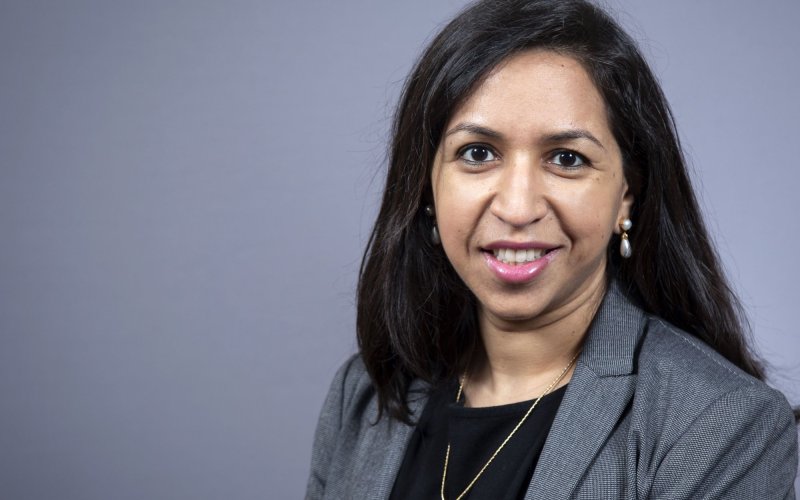5 Questions with Faculty: Niloufer Siddiqui

ALBANY, N.Y. (March 29, 2022) — After completing a master’s degree in international relations at Johns Hopkins University, Assistant Professor of Political Science Niloufer Siddiqui returned to Pakistan, where she had spent time growing up, to work in the field of international development. The opportunity provided her with a first-person perspective of the issues confronting her country of origin, including political violence, religious intolerance and government development.
She later returned to the United States to complete her PhD in political science at Yale, before joining UAlbany’s Rockefeller College of Public Affairs and Policy as an assistant professor in 2018.
Her fields of interest include political violence, the politics of religion and ethnicity, electoral dynamics in developing or transitioning democracies, and voters and foreign policy.
So much has changed both in the United States and in the Pakistan region in last 20 years. What do you see as the biggest challenges for Pakistan, historically and for the future?
The challenges facing Pakistan are unfortunately numerous. The situation in neighboring Afghanistan, as you mention, is likely to have repercussions in Pakistan, and we have already seen an increase in militant activity and terrorist attacks in recent months. The country’s economic outlook is also grim, with inflation soaring and causing hardships for most citizens.
Like many other developing countries, climate change is also a real and pressing concern. Finally, the precarity of the current government means that a lot of these urgent issues have taken a back-seat, and will likely to continue to do so. Nonetheless, I think there is also a lot of room for optimism, particularly when you look at the movements coming out of the country demanding greater rights for women, ethnic minorities, and religious communities.
After decades of foreign policy stumbles, the United States is perhaps starting to move away from the concept of nation-building in place such as Afghanistan and Iraq. Are there lessons to learn on how to better interact with nations whose development and forms of government differ substantially from our own?
This is a tough question, for which I’m not sure there is an easy answer. It is, in fact, a question that I have been discussing with students in a course I am teaching this semester called “International Development in Conflict Settings,” loosely based on a class for which I was a teaching assistant in graduate school.
In it, we examine the relationship between aid, politics and violence, and look at the ways in which development assistance often complicates, and sometimes makes worse, the lives of ordinary people in conflict and post-conflict settings. State-building and nation-building are even more complicated questions. I do think it’s pretty clear that the United States, whatever its intent, has historically failed at these endeavors.
One of your articles recently won an award for exploring whether exploring the contributions of marginalized religious groups can change the way those groups are viewed within society. What prospects have you seen in your research that might help promote tolerance or reduce prejudice between different groups?
There is a lot of research being done in political science and other related disciplines on how to promote tolerance between different ethnic, religious, or sectarian communities. Some scholars have found, for example, that intergroup contact — working together or even playing on the same sports team — can successfully build social cohesion, even in post-conflict settings. Other research, including my own, has found that emphasizing a shared common identity can increase tolerance towards out-groups.
Still other research finds that religious clerics can promote tolerance and social cohesion by appealing to scripture, which may be particularly effective to persuade certain religious audiences. However, my research and that of others shows that such clerical appeals only work in certain limited circumstances and any appeal must be devised with the local context in mind.
These are hard problems, and there aren’t simple one-size fits all solutions. Researchers are testing all sorts of different interventions to see what works where and with what populations. There’s still a lot we don’t know, but that makes the work all the more important.
You’ve lived in many countries and attended schools throughout the United States. What led you to UAlbany?
All of my higher education was completed in the United States, starting with Haverford College outside of Philadelphia, then the Johns Hopkins School of Advanced International Studies in D.C., and finally Yale University in New Haven where I did my PhD. I ended up in Albany pretty randomly, as it was a place where both my spouse and I were able to find jobs we both liked. But we have been very happy to make it our home since moving here five years ago.
I have been thankful to have an intellectually rich and incredibly supportive community, both within the Political Science Department and in the University more broadly. Albany is also a great city, attracting many smart, passionate people from all over the world.
What are the books do you think would help people better understand the global communities around them beyond just the headlines we see every day?
Two books that have stuck with me in recent years are We Crossed a Bridge and it Trembled: Stories from Syria by Wendy Pearlman and No Good Men Among the Living by Anand Gopal.
The first book is an amazing compilation of stories and testimonies of Syrians who lived through the Arab Spring and its aftermath and the recent war. The second is a journalistic account of the Afghan War, which I found incredibly rich in details of local dynamics. It was also eye-opening in showing how utterly the United States failed to understand what was happening at the local level in Afghanistan.




